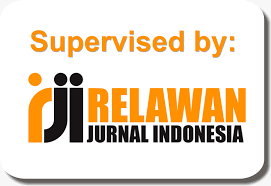USING YOUTUBE VIDEOS TO ENHANCE THE EFL STUDENTS’ VOCABULARY MASTERY
Keywords:
YouTube, vocabulary mastery, digital-based learning mediaAbstract
Vocabulary is one of the important elements of language. It supports students to be able to master four skills in English. YouTube Videos as a digital-based learning medium can demonstrate language skills better than using audio, which is usually used in conventional teaching. This research aimed to find out whether students who were taught using YouTube videos could improve their vocabulary mastery compared to students who were not taught using YouTube videos. This research used a quantitative approach with a quasi-experimental design. The samples used in this research were students in Class VIII C and VIII D. To collect the data, the researcher used the research instrumentation in the form of vocabulary to measure the students’ prior knowledge before the treatment and to see the students’ treatment results. Furthermore, to analyze the data, the researcher used the t-test. Based on the results collected after conducting this research, the results of the research showed that there was a significant effect of using YouTube videos on vocabulary mastery in students in the experimental class. Students’ English vocabulary learning using YouTube videos was more effective than without using the conventional way of teaching vocabulary. In conclusion, YouTube videos could be used as an alternative way to teach vocabulary to EFL students, especially in the Indonesian context.
References
Albahlal, F. S. (2019). The impact of YouTube on improving secondary school students’ speaking skills: English Language Teachers’ perspectives. Journal of Applied Linguistics and Language Research, 6(2), pp. 1-17.
Bhusaery, R. D., Chaerul, A., & Kamil, A. B. (2024). Investigating students’ response of using video-based learning method through YouTube on English vocabulary learning. INFOTECH Journal, 10(1), 128-131.
Cabanas, L. G., & Mercado, P. N. (2024). Using YouTube videos to improve students’ speaking skills: EFL teachers’ perceptions. MEXTESOL Journal, 48(4), 1-11.
Dielman. (1961). Applied regression analysis for business and economics. PWS KENT Publishing Company.
Dila, V. & Tridinanti, G. (2021). Improving speaking skill by using YouTube. Didascein Journal, 2(2), pp. 125-131.
Stratton, J. M. (2022). Intentional and incidental vocabulary learning: The role of historical linguistics in the second language classroom. The Modern Language Journal, 106(4), pp. 837-857.
Julistri, A., Tridinanti, G., & Manurung, J. E. (2024). The correlation between vocabulary learning strategies and reading comprehension. Didascein Journal, 5(1), pp. 30-43.
Kabooha, R., & Elyas, T. (2018). The effects of YouTube in multimedia instruction for vocabulary learning: perception of EFL students and teachers. English Language Teaching Journal, 11(2), 72-81.
Kelsen, B. (2009). Teaching EFL to the iGeneration: A survey of using YouTube as supplementary material with college EFL students in Taiwan. CALL-EJ Online, 10(2), pp. 1-18.
Lee, L. (2010). Fostering reflective speaking and interactive exchange through blogging in an advanced language course. ReCALL, 22(2), pp. 212-227.
Lelawati, S. D. (2018). The teaching of English vocabulary to young learners. PROJECT (Professional Journal of English Education, 95-100.
Nofrika, I. (2019). EFL students’ voices: The role of YouTube in developing English competencies. Journal of Foreign Language Teaching and Learning, 4(1), 56-73.
Noytim, U. (2010). Weblogs enhanching EFL students’ English language learning. Procedia Social & Behavioral Sciences, 2(1)127-132.
Riyadi, R. A., & Tridinanti, G. (2023). The correlation between students’ habit in watching English movie and vocabulary mastery. Didascein Journal, 4(1), pp. 27-34.
Schmitt, N., & Schmitt, D. (2020). Vocabulary in language teaching. Cambridge University Press.
Silviyanti, T. (2014). Looking into EFL students’ perception in listening by using English movie videos on YouTube. Studies in English Language and Education, 1(1), pp. 42-58.
Sugiyono. (2015). Metode penelitian pendidikan: pendekatan kuantitatif, kualitatif, dan R&D. Alfabeta.
Sun, Y. (2009). Voice blog: An exploratory study of language learning. Language Learning & Technology Journal, 13(2), pp. 88-103.
Soma, R. (2015). The effect of authentic texts on increasing the vocabulary mastery and reading literacy of the sixth-semester English major students of Jambi University. Unpublished magister thesis, Sriwijaya University.
Thonbury, S. (2002). How to teach vocabulary. England: Pearson Educational.
Watkins, J., & Wilkins, M. (2011). Using YouTube in the EFL classroom. Language in Education in Asia, 2(1), 113-119.
Downloads
Published
How to Cite
Issue
Section
License
Copyright (c) 2025 Robi Soma

This work is licensed under a Creative Commons Attribution-NonCommercial-ShareAlike 4.0 International License.







